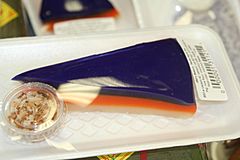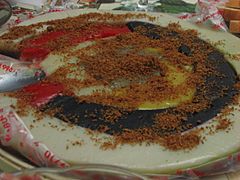Sapin-sapin facts for kids
 
Top: a slice of sapin-sapin sold at a market in California; Bottom: a more common preparation of sapin-sapin sprinkled with latik in the Philippines
|
|
| Course | Dessert or Snack |
|---|---|
| Place of origin | Philippines |
| Region or state | Cagayan, Isabela |
| Serving temperature | Room temperature |
| Main ingredients | Glutinous rice |
| 100 kcal (419 kJ) | |
Sapin-sapin is a yummy dessert from the Philippines. It's made with layers of sticky rice and coconut. The name sapin-sapin means "layered" in the Ibanag language. This dessert is famous for its colorful layers.
It uses ingredients like rice flour, coconut milk, sugar, and water. It also has different flavors and colors. Often, it's topped with latik, which are crispy coconut curds. Sometimes, it has toasted coconut flakes.
Traditionally, each layer of sapin-sapin has a special flavor. For example, the purple layer might taste like ube halaya (purple yam). The yellow or orange layer might taste like jackfruit. The white layer usually has no added flavor. However, some versions sold today use only food coloring to make the layers colorful. This helps to keep the cost lower.
How to Make Sapin-sapin
Making sapin-sapin involves mixing a few simple ingredients. You start by combining glutinous rice flour and sugar in a big bowl. Then, you add condensed milk, coconut milk, and vanilla extract. You mix everything until it's smooth.
After mixing, you divide the batter into three parts.
- For the first part, you add mashed purple yam and purple yam extract. You also add violet food coloring to make it purple.
- For the second part, you add jackfruit and yellow food coloring. You mix this well.
- The third part is usually left plain, without any added flavor or color.
Each colored part is then steamed in layers. This creates the beautiful, colorful dessert.
See also
 In Spanish: Sapin-sapin para niños
In Spanish: Sapin-sapin para niños
 | John T. Biggers |
 | Thomas Blackshear |
 | Mark Bradford |
 | Beverly Buchanan |

